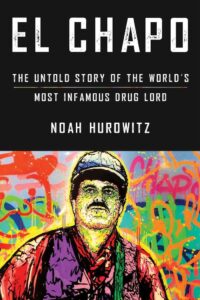Paul O’Connor, my esteemed colleague from our years with the Winston-Salem Journal’s editorial pages, occasionally still writes a book review for this blog. I’m always happy and enlightened when that happens.
Reviewed by Paul T. O’Connor
 EL CHAPO: THE UNTOLD STORY OF THE WORLD’S MOST INFAMOUS DRUG LORD. By Noah Hurowitz. Atria Books. 333 pages. $30, hardcover.
EL CHAPO: THE UNTOLD STORY OF THE WORLD’S MOST INFAMOUS DRUG LORD. By Noah Hurowitz. Atria Books. 333 pages. $30, hardcover.
On the night of July 11, 2015, Joaquin Archivaldo Guzman Loera reinforced his reputation as one of the world’s greatest escape artists when, for the second time in his lifetime, he broke out of a high-security Mexican prison.
Mexico had placed El Chapo, as Guzman is better known, in Altiplano, the country’s highest-security facility, a prison secure enough to be successfully holding most of the country’s other high-profile incarcerated narcos.
But Guzman had been embarrassing the nation’s political and security leadership for decades, escaping first from the Puente Grande prison in 2001 and then, on numerous occasions, during raids of his various homes and safe houses by military, police and security forces, often through tunnels.
After El Chapo’s February 2014 capture, however, President Enrique Pena Nieto was so certain that Guzman’s luck had run out that he boasted that the great escape artist would stay behind Altiplano’s bars for the rest of his life. He escaped 18 months later.
The news of this escape swept across the world, reinforcing El Chapo’s notoriety as maybe the planet’s most recognized criminal.
When Mexican marines stormed the house where El Chapo was sleeping on January 8, 2016, he appeared to have escaped again, this time using a tunnel hidden under his bathtub. His luck ran out 12 miles away, however, at a police roadblock. This time, Mexican authorities were less boastful. They returned him to Altiplano, moved him frequently to confound future escape attempts, and then extradited him to the United States in January 2017.
It is at that point that journalist Noah Hurowitz picked up the story for Rolling Stone. He covered El Chapo’s subsequent federal trial and conviction and then, with exhaustive additional research, produced this gripping history of the drug war. It is marketed as an El Chapo biography, but it is more a one-volume history of the Mexican drug cartels, a nonfiction alternative to Don Winslow’s fictionalized trilogy, a hardcover supplement to Netflix’s narcos series.
Of El Chapo, Hurowitz writes: “He was never the only kingpin in town, nor even the most powerful; he was just one powerful leader in a federation of powerful leaders. … But El Chapo, with his prison break and his decade-plus track record of making fools of the cops and soldiers and gringos chasing him, was the lightning rod, the face of it all.”
The broader story is one of institutionalized corruption in Mexico, of cooperation between the nation’s political and narcotics leaders. El Chapo could have never escaped as many times as he did without the help of high-ranking government officials, nor could illegal drugs have flowed north in the volumes that they did – and do – without government help. But after the cash flowed from American drug consumers back to cartel lords, a good portion of it also landed in the pockets of officials ranging from local police to the very highest officers of the national government.
As Hurowitz sees it, Mexican drug cartels never sought political control in their homeland, unlike drug cartels in other countries. To the contrary, they worked side-by-side, accepting that Caesar deserved his share as long as they got theirs, too. Thus, the cartels did not pose a direct political threat to Mexico’s leaders. They did, however, pose indirect threats, such as anti-drug pressure from the U.S., and from a population that was exhausted by the unending violence. In the end, that pressure landed El Chapo in a U.S. prison bearing life-plus sentences.
In our culture, we often glamorize organized crime – see The Sopranos or The Godfather movies. Read this book, however, and there can be no glamorizing of the Mexican drug cartels. Hurowitz has provided his readers with a horrifying look at a drug-driven dystopia run by sociopaths. It is a frightening but enlightening read.